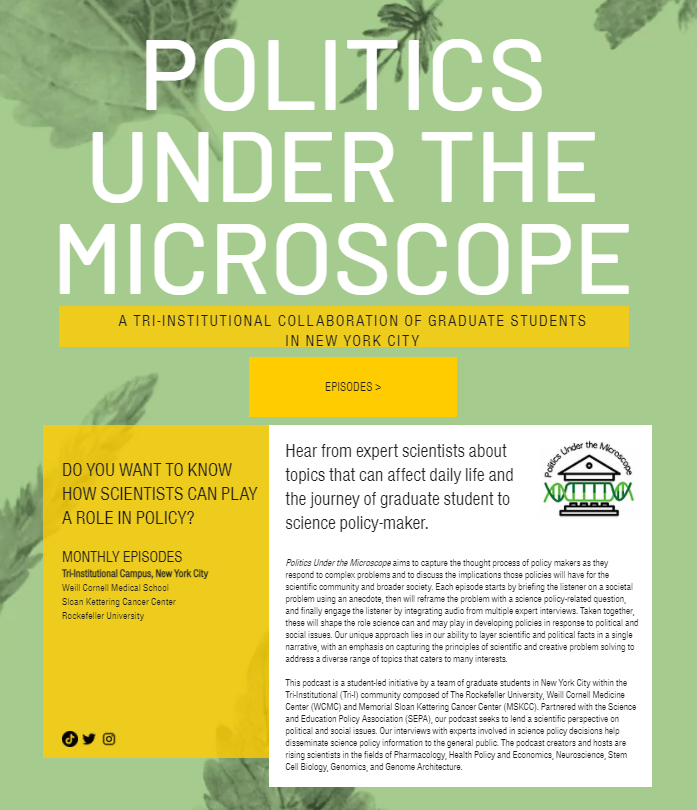Microgrant Spotlight: Politics Under The Microscope

Featured below is a guest blog from one of our previous micrograntees, Politics Under The Microscope (PUTM). In January 2021, four graduate students from the Tri-Institutional Community of The Rockefeller University, Weill Cornell Medicine Center, and Memorial Sloan Kettering Cancer Center in New York City, NY joined forces to use their Civic Engagement Microgrant to create a science policy podcast series. These rising scientists with backgrounds ranging from health policy to neuroscience to pharmacology investigate the intersections of science, policy, and legislation.
(By the way- Don’t forget to submit your application for Research!America’s Civic Engagement Microgrant Initiative by October 19.)
This piece reflects the opinions of the authors.
Our Project
Our monthly podcast, Politics Under the Microscope (PUTM), captures the ideas of policymakers as they respond to complex problems and discusses the implications policies will have for the scientific community and the general public. Each episode starts by briefing the listener on a societal problem using an anecdote, then will reframe the problem with a science policy-related question, and finally engage the listener by integrating audio from multiple expert interviews. We layer scientific and political information into a single narrative to provide a multifaceted view, with an emphasis on capturing the principles of scientific and creative problem solving to reach a broad audience.
Our Challenges
In creating a new podcast, we faced three primary challenges.
-
Limited time. As full-time graduate students, our team has often found it difficult to dedicate the time and effort required to meet our goal: to highlight the role science can play in developing policies in response to political and social issues. So far, we have addressed our challenge of being time-poor through careful scheduling and dividing up large tasks. We meet weekly to collaborate on smaller-scale projects and brainstorm content for our audience. Allotting time every week to work on our podcast has been essential to maintaining productivity and collaborating effectively.
-
Building and retaining our audience. A podcast needs a consistent and reliable social media presence and outreach to other organizations who will promote us on their platforms and vice versa. Using a divide-and-conquer strategy, our team allocated each member a social media platform (i.e. Twitter, Instagram, etc.) to regularly advertise our episodes.
-
Creating high-quality content. Ensuring non-partisan, unbiased, and accurate content can’t be overcome by time alone. It involves a lot of critical thinking and relationship building to vet our work. We spend extra hours carefully editing the content of interview recordings, fact checking our content, and adding commentary on relevant background information for our audience.
What Policymakers Need to Know About Science
Science is a field built on skepticism and the quest for an unbiased understanding of how the natural world operates. Scientists aim to discover functional truths about reality by asking questions, experimenting, and using the data they obtain to ask deeper questions until the facts are clear.
In using scientific knowledge to make political or cultural decisions, it is critical to recognize that scientific knowledge isn’t inherently political, although it can be politicized by the entities that interpret it. Policymaking itself can be seen as a scientific endeavor — the best policies are implemented like “experiments” and are improved over time based on data collected from society regarding their efficacy, as shared by Adam Grant.
What We Enjoy Most About Policy and Advocacy
Policy and advocacy require active critical thinking (and listening) and the ability to understand how other perspectives are valuable in finding solutions to improve society. Policy is the broad application of insight and action. Advocacy is often more personal. Coming together as a community requires introspection and applying the same insight to the needs of others for tangible action.
Both policy and advocacy focus on the public good, which strives to create a better community, nation, and world. Both are “team sports” in the sense that they require a multitude of talents and strengths, and encourage individuals to utilize their talents in a way that allows all of us to win together.
Our Episodes:
Current events often dictate science policy discussions. Following an introduction to science policy, PUTM’s podcasts have predominantly focused on different aspects of COVID-19, such as vaccination, legislation, and vaccine hesitancy.
Next, Politics Under the Microscope will tackle two pressing issues in our society: mental health and climate change. Mental health challenges are rampant in the graduate student population. In the coming weeks, our podcast will 1) frame the crisis, 2) present several strategies to manage mental health challenges, and 3) explore systemic reasons for the crisis. Subsequently, our podcast will address climate change. We will explore policy initiatives to address the crisis, local efforts to combat the effects of the crisis, and the ways in which scientists and scientific thinking inform environmental policy.
Advice for Getting Started In Science Policy
Find individuals who you work well with and who share a passion for science policy. These individuals do not necessarily have to be your friends beforehand; in fact, our podcasting group first met one another online over Slack. Our team has made tremendous progress that none of us expected primarily due to our investment in the creative process for our episodes and in furthering our outreach efforts. Finally, don’t be afraid to ask for advice and make connections with people who are already involved in science policy and/or advocacy. Networking, building relationships with mentors (and mentees), and sharing your ideas with others contributes to your overall success.
We would love your feedback!
Please listen to our episodes and provide feedback through our listener survey. We are always looking to improve the quality of our content as well as cover and discuss topics that are of interest to you. If you have any suggestions for topics, let us know in our contact form on our website at www.politicsunderthemicroscope.com.




